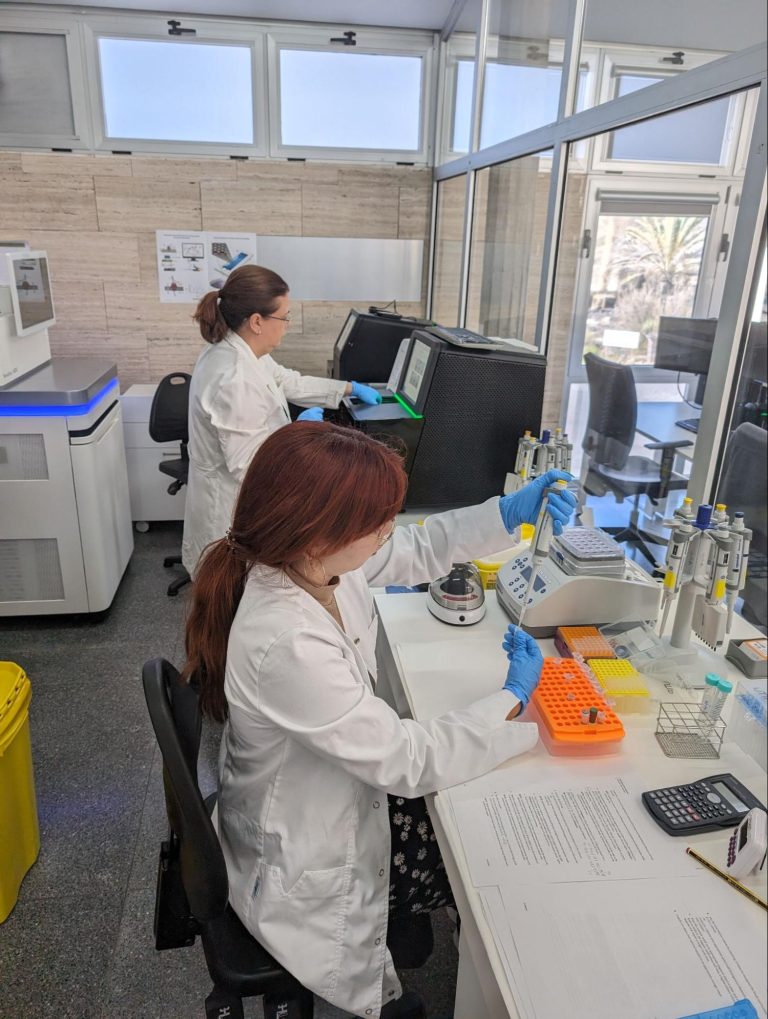
El área de Genómica comenzó su andadura en septiembre de 2016 como una apuesta del Cabildo Insular de Tenerife y de ITER para la promoción y el desarrollo de proyectos de investigación relacionados con el desarrollo de la Medicina Personalizada de Precisión en Canarias.
La actividad del área permite desarrollar uno de los objetos sociales de ITER, en particular, la creación de infraestructuras, la formación y capacitación de personal científico y técnico y la explotación como actividad industrial y mercantil de los recursos de la empresa en el ámbito de la Biotecnología. Para ello, el área de Genómica cuenta con un laboratorio de Biología Molecular, equipado con secuenciadores de ADN de nueva generación y toda la instrumentación auxiliar necesaria para la preparación de librerías de ácidos nucleicos.
En estas modernas instalaciones es posible la secuenciación masiva de ácidos nucleicos empleando diversas metodologías como son la secuenciación de genomas completos (WGS), secuenciación de exomas completos (WES), transcriptómica (RNA-Seq), epigenómica (MethylSeq), genómica funcional (ChIP-Seq), etc. Además del empleo de protocolos de secuenciación estándar como los citados, el laboratorio de Genómica de ITER puede adaptar y configurar protocolos específicos para proyectos singulares apoyándose en su laboratorio de Biología Molecular.
El equipo humano del área de Genómica está formado por personal científico y técnico especialista en Ciencias de la Vida, Biomedicina, Ciencias de la Computación e Ingeniería Informática, entre otras.
La red de colaboradores incluye instituciones académicas y hospitalarias, así como entidades científicas nacionales e internacionales con las que se ha venido estableciendo convenios de colaboración destinados a la promoción de proyectos de I+D+i en diversos campos donde la Genómica ofrece soluciones innovadoras y eficientes.
El área de Genómica no realiza secuenciación bajo demanda de particulares. Sin embargo, por su doble vocación de investigación científica y de servicio, colabora con las instituciones y entidades referidas en el diseño de soluciones adaptadas, experimentos, secuenciación masiva de ácidos nucleicos, procesado de datos y en la interpretación de los resultados.
Toda esta actividad se canaliza a través de varios proyectos vertebradores, entre los cuales destaca por su relevancia e interés general el desarrollo del denominado Servicio de Análisis Masivo de Datos Genómicos, a instancias del Cabildo Insular de Tenerife, que tiene múltiples aplicaciones en diversos ámbitos. Además de los ya citados, se trabaja en líneas de investigación y desarrollo en genética de poblaciones y biodiversidad, enfermedades prevalentes, en el estudio de la variación somática, en la aplicación de nuevas tecnologías de secuenciación masiva de tercera generación, y la creación de un ecosistema de herramientas bioinformáticas para el procesado de BigData, entre otros.

